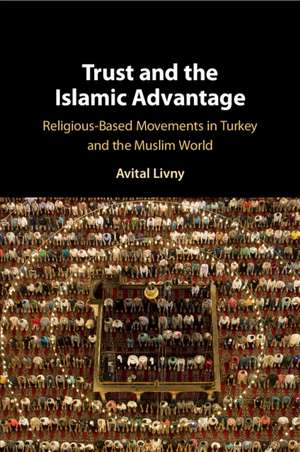Trust and the Islamic Advantage: Religious-Based Movements in Turkey and the Muslim World
Autor Avital Livnyen Limba Engleză Paperback – 13 apr 2022
| Toate formatele și edițiile | Preț | Express |
|---|---|---|
| Paperback (1) | 237.77 lei 3-5 săpt. | +15.34 lei 7-13 zile |
| Cambridge University Press – 13 apr 2022 | 237.77 lei 3-5 săpt. | +15.34 lei 7-13 zile |
| Hardback (1) | 601.04 lei 6-8 săpt. | |
| Cambridge University Press – 2 sep 2020 | 601.04 lei 6-8 săpt. |
Preț: 237.77 lei
Nou
Puncte Express: 357
Preț estimativ în valută:
45.50€ • 47.50$ • 37.65£
45.50€ • 47.50$ • 37.65£
Carte disponibilă
Livrare economică 14-28 martie
Livrare express 28 februarie-06 martie pentru 25.33 lei
Preluare comenzi: 021 569.72.76
Specificații
ISBN-13: 9781108707237
ISBN-10: 1108707238
Pagini: 269
Ilustrații: Worked examples or Exercises
Dimensiuni: 152 x 229 x 15 mm
Greutate: 0.4 kg
Ediția:New ed
Editura: Cambridge University Press
Colecția Cambridge University Press
Locul publicării:New York, United States
ISBN-10: 1108707238
Pagini: 269
Ilustrații: Worked examples or Exercises
Dimensiuni: 152 x 229 x 15 mm
Greutate: 0.4 kg
Ediția:New ed
Editura: Cambridge University Press
Colecția Cambridge University Press
Locul publicării:New York, United States
Cuprins
Part I. Theoretical Development: 1. Understanding the rise of Islamic-based movements in the Muslim world; 2. Evaluating existing theories of the Islamic advantage; 3. Generalized distrust and the participation gap in the Muslim world; 4. Muslim identity and group-based trust; Part II. Applications and Empirics: 5. Explaining the Islamic advantage in political participation; 6. Islam, trust, and strategic voting in Turkey; 7. The quasi-integration of firms in an Islamic community: the case of MÜSİAD; 8. Conclusion; Appendix; Bibliography; Index.
Recenzii
'One of the central obsessions of scholars of the Muslim world has been to explain why many of that world's most successful political parties have been ones dedicated to legislating Islamic law. Avital Livny offers a fresh answer to this old question: Religion matters, not by shaping what voters want, but by providing group members with a shared identity. Drawing on a variety of data both qualitative and quantitative, observational and experimental, Livny demonstrates that Islamists' shared religious identity enables them to overcome the mistrust that plagues developing societies, rendering them in turn more capable than their opponents of acting collectively and of garnering the votes of their compatriots. This is a deeply impressive work of social science that speaks powerfully to anyone interested in understanding how religion and religious identity function in political life.' Tarek Masoud, Sultan of Oman Professor of International Relations, John F. Kennedy School of Government, Harvard University, Massachusetts
'… Trust and Islamic Advantage makes an empirically rich and theoretically engaging contribution to the scholarship on religion and politics and Middle Eastern politics. With its meticulous empirical analyses, it will stimulate high-quality scholarly discussions on the role of identity-based trust in political processes in Muslim-majority countries and beyond.' Güneş Murat Tezcür, Perspectives on Politics
'… Trust and Islamic Advantage makes an empirically rich and theoretically engaging contribution to the scholarship on religion and politics and Middle Eastern politics. With its meticulous empirical analyses, it will stimulate high-quality scholarly discussions on the role of identity-based trust in political processes in Muslim-majority countries and beyond.' Güneş Murat Tezcür, Perspectives on Politics
Notă biografică
Descriere
This cutting-edge analysis of Islamic politics and economics shows how Islam builds trust in communities and serves as a collective identity.
